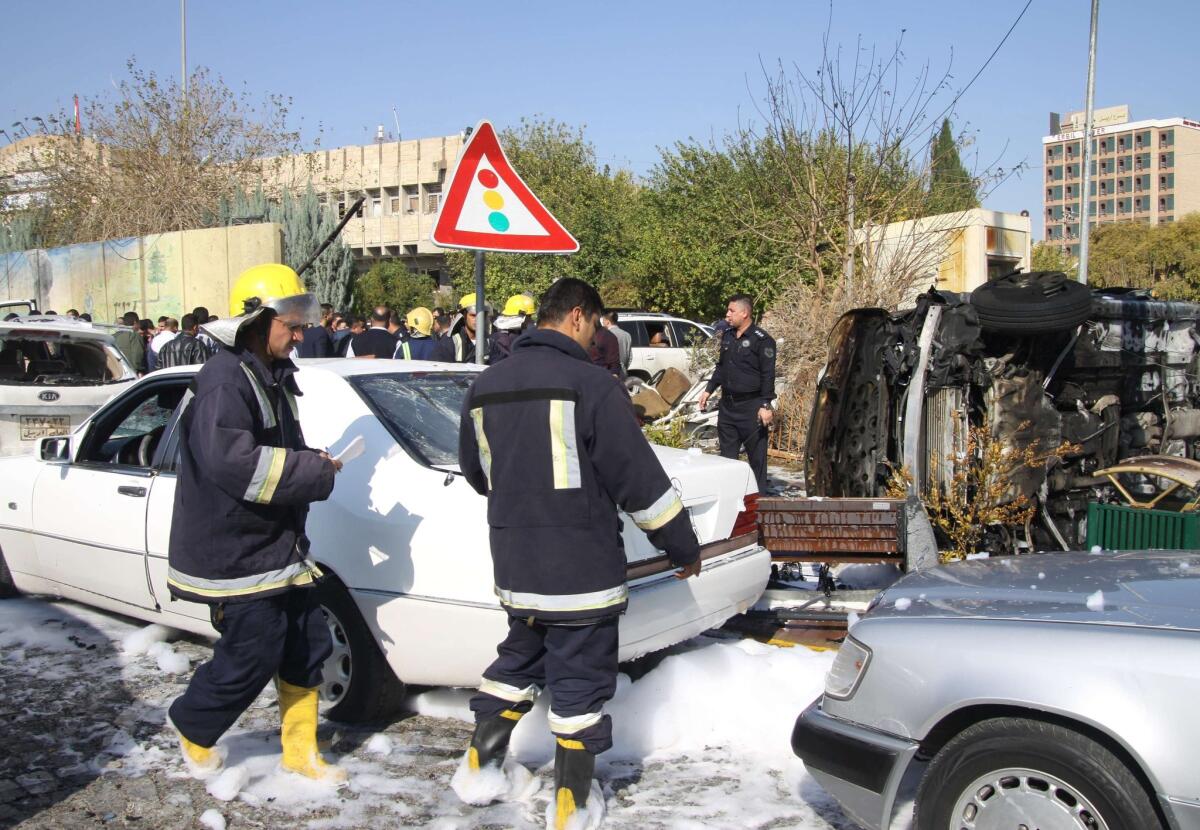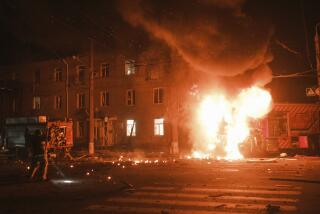Suicide bomber kills 5 in usually secure Irbil, Iraqi Kurdish capital

- Share via
Reporting from Beirut — A suicide car bombing stunned the normally secure northern Iraqi city of Irbil, capital of the semiautonomous Kurdish region, while Kurdish and Iraqi government forces mounted a new offensive against Islamic State militants.
The explosion, which struck at midday Wednesday, killed five people in addition to the attacker and wounded dozens near the heavily guarded Kurdish government compound in central Irbil, a city that has been largely insulated from the war against extremists raging nearby.
Meanwhile, U.S. Central Command announced that 24 new airstrikes had been conducted against Islamic State positions in Iraq from Monday through Wednesday, including 13 strikes near the Kurdish-held northern oil city of Kirkuk, south of Irbil, and seven near Mosul, an Islamic State stronghold west of Irbil.
The Kurdish news site Rudaw quoted a local lawmaker saying that four senior Islamic State figures, including the militant-appointed chief of Mosul, were killed in the latest U.S. airstrikes on the city, Iraq’s second-most populous. There was no independent corroboration of the report.
The U.S.-led coalition also carried out six airstrikes against Islamic State positions in neighboring Syria and one against the so-called Khorasan Group, which the Pentagon says is a network of veteran Al Qaeda operatives plotting attacks against the West. It was the fourth U.S. air assault since September targeting the Khorasan network, which is linked to Al Nusra Front, the official Al Qaeda affiliate in Syria.
The Kurdish administration based in Irbil is closely allied with the United States. U.S. military advisors are working with Kurdish peshmerga forces, as well as with the Iraqi military.
Car bomb attacks, while an almost daily occurrence in Baghdad, the Iraqi capital, are unusual in Irbil, a prosperous city of more than 1 million that is a regional oil hub. It hosts many foreign companies and is home to a sizable expatriate population.
In August, the Pentagon began airstrikes against Islamic State in Iraq after militants advanced to within about 25 miles of Irbil, causing a temporary panic in the Kurdish capital. But Kurdish fighters, aided by U.S. air power, have since pushed the militants back.
Nonetheless, Islamic State still controls large swaths of northern and western Iraq, along with extensive territory in northern and eastern Syria. The Sunni Arab militants have threatened to strike the Kurdish heartland in the north.
Kurdish authorities fear that sleeper cells could be plotting attacks in Irbil and other Kurdish cities. The Kurdish region has seen an influx of hundreds of thousands of displaced persons from throughout Iraq. Officials say a small minority of the displaced may be Islamic State sympathizers and infiltrators.
“Kurdistan is facing a great threat regionally from ISIS,” Irbil’s governor, Nawzad Hadi, told reporters after Wednesday’s blast, using a common acronym for Islamic State.
The governor, who was reportedly in his office when the car bomb detonated outside, blamed Islamic State for the attack.
No group immediately claimed responsibility for the bomb, which detonated outside blast walls protecting the governor’s compound in the center of Irbil, not far from the historic citadel. Authorities said the suicide attacker was attempting to enter the compound when the bomb went off.
Four of the dead were police officers and the fifth was a civilian, reported Rudaw, which also said 29 were injured in the blast.
Thinly stretched Kurdish forces are defending a 600-mile front line against the militants, stretching from the Syrian border in the northwest to the Iranian frontier in the east.
On Wednesday, Kurdish authorities said Kurdish fighters, in cooperation with the Iraqi military, had launched a new offensive against militant strongholds in the vicinity of Iraq’s eastern Diyala province, parts of which remain in Islamic State hands. The offensive “liberated” a two mile stretch of territory, Jabar Yawar, a peshmerga spokesman, said via telephone from Iraq.
Special correspondents Kamiran Sadoun in Irbil and Nabih Bulos in Beirut contributed to this report.
Follow @mcdneville on Twitter for news out of the Middle East
More to Read
Sign up for Essential California
The most important California stories and recommendations in your inbox every morning.
You may occasionally receive promotional content from the Los Angeles Times.










